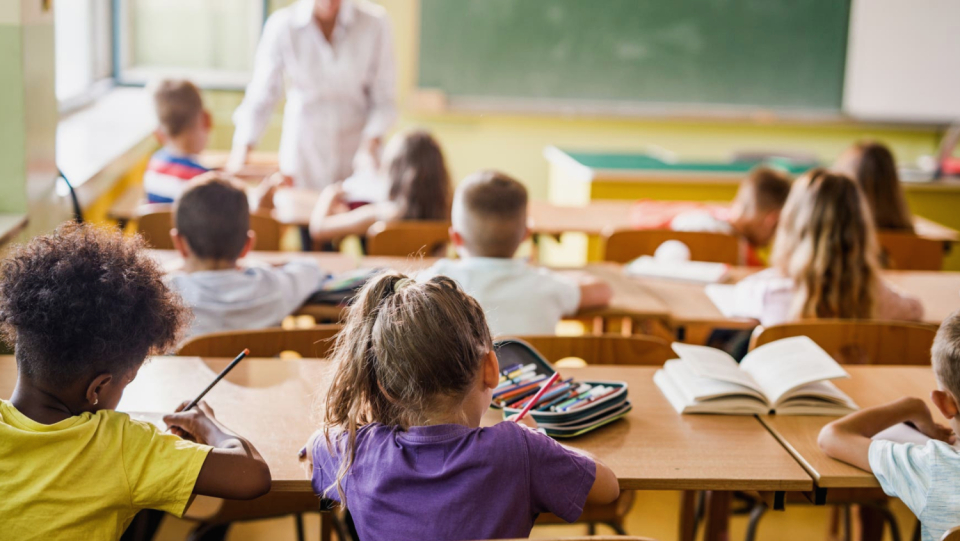At first glance, the younger children are less likely to cope with the situation. "Oh, I should know," some of them shout and hit each other on the head – even in "pressure-free" lessons. That's what Ilka Hofmann tells us. The language support teacher teaches pupils from the fifth to the tenth grade German – recently also children from Ukraine.
So far, according to the data of the Conference of Ministers of Culture, around 121,000 pupils from the Eastern European country in Germany have been taught; A total of 400,000 children and young people are expected. The focus is on one thing: learning German. But how can this succeed, while 25 to 35 percent of Ukrainian pupils with a post -traumatic stress disorder can be expected to consider many families to return to their country and still have to deal with the aftermath of coron apandemy?
How to get to class
First of all, in addition to therapeutic support, it is about parents enrolling their children in schools at all. Because even positive experiences at school could help the children and young people to deal with what they have experienced. This is the result of a letter from the Standing Scientific Commission of the Conference of Ministers of Education and Cultural Affairs (SWK).
Ilka Hofmann, for example, goes with the children free material such as school books. The students should see: "Whoever takes care of me," says the 50-year-old. A colleague would go even further. It also organizes bicycles for the children.
Certainly, some children will not be able to make such experiences for a variety of reasons. How many families intend to go back or how many children participate in online education from Ukraine cannot be said on the basis of the current data. And when they have to register at a German school also differs from state to state. In Bavaria, children are required to attend school after three months at the latest, and in Baden-Württemberg six months after immigration.
Learning collectively or individually?
But when they have been recorded - how do the Ukrainian children and adolescents learn the German language? Ilka Hofmann relies on playful work. Weekly days or months are learned by songs. Memorys can also help. The older students would prefer classic learning with school books.
Hofmann teaches the integrative model: The pupils are included in the existing classes, but for example, they receive additional language lessons per week. In the parallel model, on the other hand, the refugee children learn in preparatory classes. You can learn German with other children with a migration background, but also be taught in math, English or Ukrainian. Both models are used in Germany. According to the Friedrich Ebert Foundation, the preparatory classes of the parallel model have been part of the school system since 1960. How quickly the language is learned would depend heavily on the quality and quantity of language lessons, according to the researchers of the SWK. A statement with which model is achieved with better success "should hardly be answered so flatly," says the statement.
The sociology professor Juliane Karakayali from the Protestant University of Applied Sciences Berlin takes a clearer stand on the preparatory classes: "What else the children can do – whether they are musical talents or good football partners – hardly matters." They would be separated only according to whether they can speak the language or not.
Among other things, Karakayali looked at the language acquisition in the preparatory classes: In 2016, she examined a total of 18 "welcome classes" at Berlin primary schools within a study with colleagues from the Berlin Institute for Empirical Integration and Migration Research at Berlin. In 2020, she also carried out interviews with a colleague with teachers and school management of four primary schools that followed an integrative model. The studies examine the examined schools in detail, but are not representative. The researchers summarized the results in an analysis for the media service integration. There are still "no binding guidelines" which linguistic foundations the children should learn in the preparatory classes, the experts write. Some teachers rely on oral communication, others on specialist vocabulary. Karakayali says that there is a "massive lack of concept" when it comes to the inclusion of the newly immigrated children in the schools. A situation like in the 1960s and 1970s had to be prevented: When more and more people came from Turkey, so -called foreign regulatory classes were introduced. At that time it was not clear what was taught, explains Karakayali. Many students received no conclusion.
Meanwhile, the SWK proposes to get away from the preparatory classes – at least in primary school and in the lower grades in secondary education. The children should be integrated as soon as possible, learn the German language and take part in subject lessons. The Standing Conference of the Ministers of Education and Cultural Affairs also takes this view: According to a recent letter, the acquisition of the German language would be made possible, among other things, by "early integration into subject teaching".
Which model the children learn should not be the only decisive factor when learning German. In 2021, the educational journalist Anant Agarwala wrote in a special edition of his book "The Integration Experiment" that the placement of the German language was mainly outsourced to the preparatory classes - "it has to run after that". Thus, the residues of the refugees would increase from year to year. The SWK also writes that language support must be carried out over several years.
But according to experts, extracurricular learning is also enormously important – for example through friendships. For Karakayali, "the models in which the students speak as much as possible are particularly efficient," says the professor: "We may know that ourselves: On vacation, we learn the language faster than when we sit in a course at the adult education center." Learning together can take place together at school, on the playground or in kindergarten. Ilka Hofmann recommends all her students to speak and listen to as much as possible german outside of class – for example, to register with the football club or dance group or to watch German television.
Greater acceptance of second languages
At the moment, some federal states provide additional funds, schools recruit Ukrainian teachers who start children and young people with classes. According to Anja Bensinger-Stolze, member of the board of the Education and Science trade union, the schools are still facing the greatest. "Due to the shortage of teachers and the corona apandemia, we already have a tense situation," says Bensinger-Stolze, "now there is another crisis." Additional teaching staff and support are now needed.
For the sociologist Karakayali, long-term considerations are also crucial, not only concerning Ukrainian children: "I find it amazing that people act as if school were a place where everyone arrives with the same knowledge of German." According to a 2018 Pisa study, the difference between students with "favorable" and "unfavorable" backgrounds in Germany is considerable. A child whose parents are doctors, for example, may learn to read faster than one whose parents live on Hartz 4. While inequality is growing in Germany, other countries have long since tested aid models: In Finland, for example, some students can be supported with extra hours.
According to Karakayali, second languages such as Ukrainian should also be given more recognition. This can be achieved by being able to be tested at the Abitur: "The school must adapt more to the migration society." Not the other way around. So the question is not only how well the Ukrainian students learn German, but also how much they can build on their previous languages and use them as a strength. Both will pose challenges for the German school system.



















